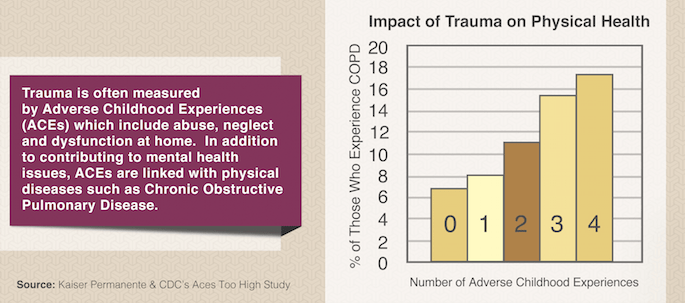Trauma Informed Care
At MDC, we interact every day with individuals who have experienced trauma. It is a pervasive and salient factor in the lives of most individuals with mental health issues. While trauma is most often recognized as resulting from a reaction to interpersonal violence and abuse, it can take on many forms. Individuals dealing with chronic adversity such as poverty and oppression certainly experience trauma. Additionally, an individual belonging to a historically traumatized group (based on race, religion, etc.) may experience symptoms of a post-traumatic response, even if they were not directly involved. This is called historical trauma, and refers to the tendency of psychological wounds to be transferred across the generations.
Even with the best intentions, mental health treatment can actually be re-traumatizing if it is done without consideration to past experiences. An unaware clinician can inadvertently ignore or stigmatize crucial experiences, or perpetuate systems of oppression. For this reason, it is crucial that mental health agencies, like MDC, adopt a trauma-informed approach to care.
The prevalence of trauma among those who suffer from mental health issues is astounding – most estimates place rates above 90 percent. Trauma is also linked to physical health concerns, as seen in the graph below. The trauma-informed care approach to treatment was born of this reality. It provides mental health, substance use and even medical treatment approaches with the assumption that every client who walks through the door has experienced trauma in their lives.
By beginning every interaction with this possibility in mind, we are able to more readily identify symptoms of trauma, and engage individual stories and lasting impacts.
Trauma informed care seeks to create a culture in which the individual seeking assistance is empowered to improve their overall wellbeing, as opposed to curing mental illness as something that stands on it’s own, separate from the individual. It emphasizes choice and collaboration, allowing individuals to determine their own priorities for wellbeing and creates space for trust and shared power between the helper and person seeking help.
MDC is embracing the trauma-informed care model in our approach to treatment for mental health and substance use issues. It also impacts our approach to services in homelessness, education and employment, as we recognize the impact that trauma has on all of the people we serve. By engaging stories of trauma, we can meet the needs of those we serve, and break the cycle of poverty, of which trauma is certainly a contributing factor.






